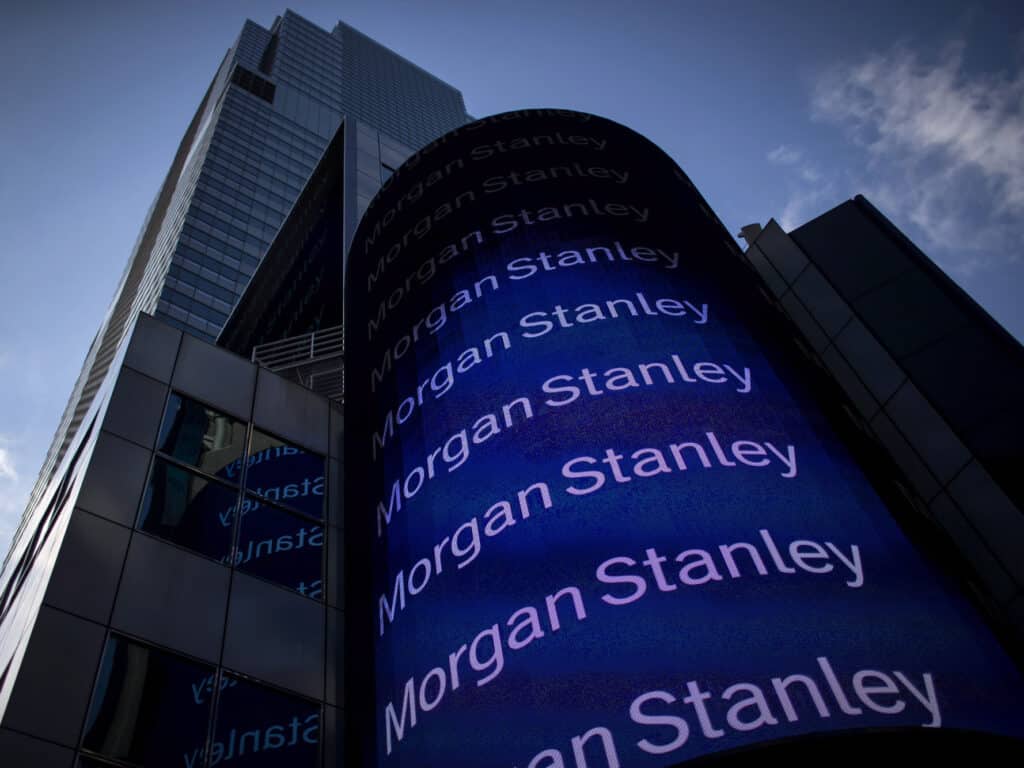Morgan Stanley Global Brands Fund Review – that will be the topic of today’s article.
Learn about Morgan Stanley Global Brands Fund and its comparison with Premier Trust.
Nothing written here should be considered as financial advice, nor a solicitation to invest.
For any questions, or if you are looking to invest as an expat, you can contact me using this form, or via the WhatsApp function below.
Introduction
For any questions, or if you are looking to invest as an expat, you can contact me using this form, or via the WhatsApp function below.
Morgan Stanley – American Multinational Investment Bank and Financial Services, headquarters at the level of 1585 Broadway in the building of Morgan Stanley in the center of Manhattan, New York. With offices in more than 42 countries and more than 60,000 employees of the company’s customers include corporations, government, institutions, and individuals. Morgan Stanley occupied the 67th place in the list of the largest corporations in the United States in the United States in terms of general income.
Original Morgan Stanley, created by JP Morgan & Co. partners. Henry Sturgis Morgan (JP Morgan’s grandson), Harold Stanley and others, appearing on September 16, 1935 in response to the Steagall law, which demanded an advertisement department and investment banking enterprises. In the first year, the company worked with a market share of 24% (1.1 billion US dollars) in public and private placement places.
The current Morgan Stanley is the result of the fusion of the original Morgan Stanley with Dian Witter Discover & Co. In 1997. Chairman Dean White and Chief Executive Officer, Philip J. Pursella, became the chairman and chief executive director of the new unification of Morgan Stanley. Dean Witter Discover & Co. In 2001, the new firm again changed its name to Morgan Stanley. The main activities of the company today are institutional securities, capital management, and investment management. The Board of Financial Sustainability believes that the bank will be systematically important.

Morgan Stanley Global Brands Fund
The investment band behind Morgan Stanley Global Brands has a mantra: “Do not lose money”, which may be comforting for investors, as familiar names that can be found in the portfolio. A team that works as a boutique in Morgan Stanley is looking for high-quality companies with protective and visible future income, allowing them to give attractive content shareholders and reinvest in their business to stay ahead.
The purpose of investment is the long-term growth of your investment. The investment team believes that high-quality companies can generate excellent income during the long-term perspective. Such companies are usually built on the dominant positions on the market, supported by powerful, it is difficult to replicate intangible assets that can generate a high treated return on operating capital and strong free cash flows. Other characteristics are repetitive income streams, price power, low capital intensity and organic growth.
The value of investment and income from them will vary and cannot be confidence that the Foundation will reach its investment purposes.
The performance of the Foundation is talking for themselves. People really like a high level of concentration of this fund, which has only 25-30 holdings and more than half of its assets in the top ten of the tenths. This shows the actual conviction from managers and is a good example of how active management can really add a value.
Morgan Stanley’s investment management is considered by Boutique Business Unit in his parent company, which means that it can work without restrictions, but still benefits from long-term relationships and recognition of the brand that Morgan Stanley teams. Recipient of the elite provider on the stock rating since 2018-2021. The investment team is over $ 457 billion for customers in 23 different countries.
Morgan Stanley Global Brands manages a ten-strong team led by William Castle. William heads to the London International Capital team and joined Morgan Stanley in 1994. Before joining the company, he worked at Credit Suisse First Boston’s Corthate Finance Group and was a consultant to manage Arthur D. Little. William has Ba in modern history from Kinsky College, Oxford.
There is an open and flat structure for the investment team that all London. Each participant is assigned two or three sectors to cover, since each will have different ways to search for shares. They can freely analyze the company in their own way, but are aware of the key characteristics of the fund as a whole.
Investment process

The fund is a very concentrated portfolio of high-quality global companies. Criteria The team is looking for a qualitative company to determine, are such functions as Inthanate Assets, such as strong network benefits and brands, or licenses and permissions that can provide an advantage over competitors. They will also search for companies that enjoy the economies of scaling and leading market distributions.
The strategy is focused on creating absolute income and without losing money through the election of team shares. The process will start from the screen to identify these companies reaching high yields: is determined by a strong return on capital, low credit shoulder, and low capital intensity. In addition, each shares will have to give up at least 1% to show the commitment to minority shareholders.
From this list, managers will analyze whether the return is historically, are resistant to promotion forward. They will need to see that the qualitative characteristics of the company can be protected, and that the firm controls its own destiny. Therefore, they will analyze the threat of new participants and environmental and social factors.
The third step will confirm the investment history with the management teams. This is important before investments, as the team believes that the first thing that damage to business is people. The team will also have conversations with other stakeholders and will look at the strategy of enterprises, and not just quarterly earnings.
As soon as they found investment companies, they will assign every rating.
The resulting portfolio holds from 20 to 40, but a sweet place will be about 25-30. This will be primarily media, discretionary and medical services, and medical services. High-quality industrial companies will also be able to demonstrate cyclic protection. Managers deliberately avoid banks, useful, telecommunications and energy companies, as they do not control their own fate and rely on external factors.
Shares are bought with a four-year forecast, which means the turnover is about 25%, although positions will be crowned with tail, depending on their characteristics and attractiveness. Although the foundation can invest on a global scale, it usually has an overwhelming majority of its assets in developed. Nevertheless, Holdings can still have a significant impact on the market due to their global business lines.
Risk

Managers determine the risk as a constant loss of capital and therefore evaluate potential drivers behind this in the process of selecting shares. They will consider factors in various categories, including the sustainability of the strong position of society, the effect of technological violation, and sensitivity to the macroeconomic environment. They will also evaluate the impact of regulatory acts on sectors and the risk of error management – from here and severe focus on the team meeting during the process.
Definitions of positions depending on how much conviction exists in the company with a portfolio quietly divided into three sectors. The best five owners should have a lot of beliefs and with good estimates, with the size of the positions of more than 5%. The next part of the portfolio will be placed about 3%, since the investment case is usually absent in one key element – often an attractive assessment. The final sector will be a tail of positions about 1-2%. Only tenth names make up more than 50% of the portfolio.
Types of other investment risks
1. Market risk
The investment risk can be decreased in values because of economic or other events that can have an affection on the entire market. Main types of market risk are risk of shares, interest rates risk, and currency risk.
- Equity Risk – applies to investments in promotions. Market price of shares all the time varies depending on the demand and suggestions. Capital flight is a risk of loss due to the fall of the market price of shares.
- Interest rate risk – refers to debt investments such as bonds. This is the risk of losing money due to the change in interest rate. For example, if the interest rate rises, the market value of bonds will fall.
- Currency risk – applies when you own foreign investments. This risk of losing money due to traffic in the exchange rate. For example, if the US dollar becomes less valuable to the Canadian dollar, your US shares will cost less in Canadian dollars.
2. Risk of liquidity
The risk is to be unable to sell their investments at a fair price and receive money when you want. Sell investment, you may need to take a lower price. In some cases, such as liberated market investments may not be able to sell investments in general.
3. Risk of reinvestment
Imagine you buy a bond, and the payment fee is 5%. Risk of reinvestments will affect you if interest rates fall, and you must reinvest the regular interest payments by 4%. The risk of reinvestment is also applied if the bond matures, and you must reinvest less than those 5%. The risk of reinvestment will not be applied if you intend to conduct regular interest payments or principal when repaying.
4. Risk of inflation
The risk of loss in your purchasing power, because the cost of your investment does not lag behind inflation. Inflation destroys the delivery of money over time – the same amount of money will be bought less than the goods and services. Inflationary risk is especially relevant if you have in cash or debt investments, such as bonds. Shares offer some protection against inflation because most companies can increase the prices they comply with their customers. Therefore, stock prices should rise in accordance with inflation. Real estate also offers some protection, because the landlords can increase the rent over time.
Pained by financial indecision? Want to invest with Adam?
Adam is an internationally recognised author on financial matters, with over 352.8 million answers views on Quora.com and a widely sold book on Amazon



